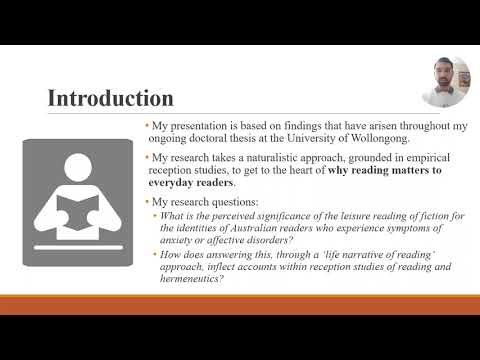 Speaker: Edsel Parke @ehtp979
Speaker: Edsel Parke @ehtp979
 Affiliation: University of Wollongong, Australia
Affiliation: University of Wollongong, Australia
Title: Narrative Identity and the Empirical Reader: A hermeneutic study into reading and mental well-being in Australia
Abstract (long version below): My ongoing PhD project draws on both reception theory and narrative identity theory to address a gap in reception studies scholarship, concerning the relationship between reading fiction and the experience of psychopathologies. Its innovative ‘life narrative of reading’ qualitative methodology emerges from the call for more naturalistic work within reception. Semi-structured interviews and narrative analysis form the basis of this approach. At this point, fifteen interviews have been undertaken, and thematic analysis is in its initial stages. The project’s theoretical triangulation and novel methodology offer new avenues forward within reception itself, and further interdisciplinary encounter with both sociology and psychology.

 Long abstract
Long abstract
This work-in-progress proposal is built on my ongoing PhD project, which is situated within the domain of literary reception studies—in particular, in its empirical consideration of qualitative, sociological approaches to everyday readers’ experience of reading.
Scholarly conversation on the relationship between reading and mental health has remained largely restricted to psychology, and understandably so. However, it is equally justifiable for reception scholars to also make their unique contributions to this conversation. The predominance of the psychological perspective, particularly in the form of applied bibliotherapy, has resulted in reading becoming closely allied to experimental psychology and to the instrumentalist understanding of literature which that entails. Literary theorists are in a position to challenge and complement such a perspective by shifting the focus back towards readers qua readers, and towards reading as hermeneutic and aesthetic-cultural practice rather than pure cognitive act.
This issue at stake may be thus formulated: Research in psychology and in sociology suggests that individuals construe themselves as ‘narrative’ beings (McAdams, 1995; Ricoeur, 2008a/1990). Anxiety and affective conditions have been shown to disrupt the narrative sense of self (Austin, 2011). Furthermore, the reading of fiction may aid the development and reconstitution of the reader’s sense of personal narrative (Hakemulder, 2000; Felski, 2008; Burke, 2011). Noting the shortcomings of inherently instrumentalist bibliotherapeutic perspectives, the current project instead explores these connections qualitatively, adopting theoretical insight from reception and narrative identity theory.
Through its interdisciplinary lens, this project aims to explore the relationship between the leisure reading of fiction and Australian readers who experience anxiety or affective conditions. It takes a qualitative ‘life narrative of reading’ methodological approach, wherein the lived experience of real readers remains fundamental. In doing so, the project challenges excessively bibliotherapeutic perspectives on literature and mental health, and endeavours to respond to the call, oft-repeated in reception scholarship, for more empirical research into real readers beyond theoretical constructions.
The proposed ‘life narrative of reading’ emerges as a response to various prompts towards renewal in reception methodology, most particularly arising out of Nolan-Stinson’s (2011) ‘life history of reading’, Boyarin’s (1993) ‘ethnography of reading’, Thumala Olave’s (2018) ‘cultural sociology of reading’, and the recent phenomenon of ‘bibliomemoir’. Using this new term ‘life narrative of reading’ both avoids confusion with the established sociological method of ‘life history’ and better reflects the project’s interest in the ongoing stories of readers’ selves, given its grounding in narrative identity theory. This approach especially draws from the narrative methodologies advocated by Mishler (1986, 1999), Freeman (1993), and Lieblich et al. (1998).
Participation criteria consisted of residency in Australia, being at least eighteen years of age, regularly reading fiction for leisure, and the experience of anxious or affective conditions. Fifteen respondents, from a range of demographic and professional backgrounds, ended up participating in the study. In accordance with the methodology detailed above, each participant underwent a qualitative individual interview, lasting between twenty-five and fifty minutes. These interviews were semi-structured, but revolved around three themes: reading and life experience, reading and mental well-being, and reading and personal identity. The interviews were transcribed and anonymised. Participants were given the option to authenticate their transcripts, and were rewarded for their time with a voucher for an Australian bookstore chain.
At this stage of progress, the data is being analysed according to narrative research principles, bearing in mind the exploratory nature of the research. Forming part of this approach is Lieblich et al.’s (1998) principle of holistic-content analysis, whereby the content of emerging narratives is interpreted in the context of participants’ broader life experiences. The impressions arising from the repeated examination of the content leads to the emergence of guiding themes, by which the data is to be coded. At this stage, it is too early to report definitively on the findings of this analysis. However, some preliminary observations may bear relevance to empirical reception studies and to the domain of literature and well-being:
Not surprisingly, everyday readers (that is, non-academic readers) delight in speaking about their reading, their lives as readers, and how reading relates to their experience of psychopathology. The semi-structured interview format provides bountiful opportunity for participants to develop self-reflection on their own reading. Phrases such as, “I’ve never really stopped to think about this before now, but it is so fascinating”, abound in these interviews. Furthermore, interesting conversations arise when everyday readers are prompted to comment on theories of reading—responses of examination by theorists themselves. Indeed, such preliminary findings suggest that naturalistic reading research, just as much as experiment-based reading research, plays an important role in informing theory within empirical reception studies, as well as informing reading-based practices such as bibliotherapy.

